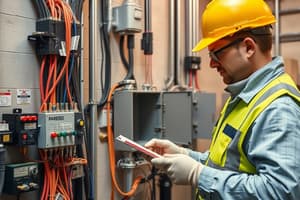Podcast
Questions and Answers
What are the consequences of neglecting standard safety protocols in the workplace?
What are the consequences of neglecting standard safety protocols in the workplace?
Neglecting safety protocols can lead to accidents, injuries, and fatalities caused by electrical shock.
How can poor communication contribute to electrical accidents?
How can poor communication contribute to electrical accidents?
Poor communication can lead to misunderstandings about the status of electrical components, increasing the risk of accidents.
Why is it critical to de-energize equipment before working on it?
Why is it critical to de-energize equipment before working on it?
De-energizing equipment is critical to prevent electrical shock and ensure a safe working environment.
What role does personal protective equipment (PPE) play in electrical safety?
What role does personal protective equipment (PPE) play in electrical safety?
Describe one of the major causes of the Circuit Breaker Incident mentioned.
Describe one of the major causes of the Circuit Breaker Incident mentioned.
What are the effects of distractions on workplace safety?
What are the effects of distractions on workplace safety?
Why is good housekeeping important in maintaining electrical safety?
Why is good housekeeping important in maintaining electrical safety?
What assumption often leads to electrical accidents, according to the content provided?
What assumption often leads to electrical accidents, according to the content provided?
Flashcards are hidden until you start studying
Study Notes
Importance of Electrical Safety
- Electricity is a crucial part of daily life, providing numerous benefits but also posing deadly risks.
- Thousands of injuries and fatalities from electrical shock occur in the workplace each year, underscoring the need for strict safety measures.
Common Causes of Electrical Accidents
- Neglecting Procedures: Many accidents arise from bypassing standard safety protocols, such as not tagging defective equipment.
- Poor Communication: Failure to communicate the status or location of electrical components between teams can lead to dangerous mishaps.
- Assumptions: Workers often assume equipment is safe without proper testing, leading to tragic consequences.
Case Studies of Electrical Incidents
- Circuit Breaker Incident: Lack of tagging and communication regarding a defective circuit breaker resulted in a fatal explosion due to improper installation by a second team unaware of the situation.
- Frustration and Distraction: A worker named Jeff almost died due to distraction and improper tool usage—plugging in a power tool without a ground can lead to severe electrical shock.
- Routine Safety Erosion: Long-term neglect of safety procedures, like not de-energizing equipment before working on it, can lead to accidents when luck runs out.
Key Safety Practices
- De-energizing Equipment: Always ensure equipment is de-energized before commencing work; this is the primary method of protection.
- Grounding and Discharge: Use proper grounding techniques to safely discharge stored electrical energy.
- Personal Protective Equipment (PPE): Always wear appropriate PPE, including gloves and insulated gear, to prevent injuries and fatalities.
Importance of Housekeeping and Environment
- Good housekeeping practices are vital for maintaining a safe work environment. This includes:
- Keeping tools organized and stored properly.
- Minimizing moisture exposure near electrical sources.
- Ensuring proper ventilation to reduce the risk of explosions from sparks in dusty environments.
Behavioral Safety
- Distractions can severely impair focus and lead to accidents—workers must stay engaged and take breaks when needed to maintain safety.
- The mindset of safety must be maintained, avoiding overconfidence and taking shortcuts, as these lead to overlooking fundamental safety practices.
Training and Reporting
- Continuous training on electrical safety and the proper use of equipment is essential for all workers.
- Immediate reporting of unsafe conditions and defective equipment is necessary to prevent accidents, ensuring a culture of safety in the workplace.
Final Reminders
- Always prioritize personal and team safety when working with electricity.
- Understand that electrical hazards may not be visible and that safety precautions must not be taken for granted.
- The goal of safety protocols is to protect lives—yours and your coworkers’, ensuring everyone returns home safely each day.
Importance of Electrical Safety
- Electricity enhances daily life but presents lethal dangers.
- Thousands suffer electrical shock injuries or fatalities annually in workplaces, necessitating stringent safety protocols.
Common Causes of Electrical Accidents
- Neglecting Procedures: Skipping essential safety protocols, like tagging malfunctioning equipment, contributes to accidents.
- Poor Communication: Inadequate sharing of information regarding electrical components between teams can result in hazardous situations.
- Assumptions: Relying on the assumption that equipment is safe without proper testing often leads to critical failures.
Case Studies of Electrical Incidents
- Circuit Breaker Incident: An explosion occurred because of an untagged defective circuit breaker, improperly handled by an uninformed team.
- Frustration and Distraction: A worker's near-fatal experience stemmed from distractions and improper tool usage, highlighting risks of unsafe practices.
- Routine Safety Erosion: Continuous disregard for safety steps, like failing to de-energize equipment before repairs, can culminate in severe accidents when luck runs out.
Key Safety Practices
- De-energizing Equipment: Always ensure equipment is de-energized as a primary protective measure before working.
- Grounding and Discharge: Implement proper grounding methods to safely eliminate stored electrical energy.
- Personal Protective Equipment (PPE): Consistently wear suitable PPE, such as gloves and insulated clothing, to mitigate the risk of injuries.
Importance of Housekeeping and Environment
- Effective housekeeping is crucial for a secure work atmosphere, which involves:
- Maintaining organization and proper storage of tools.
- Reducing moisture around electrical sources to prevent hazards.
- Ensuring adequate ventilation to minimize explosion risks due to spark ignition in dusty settings.
Behavioral Safety
- Distractions can severely compromise focus, increasing the likelihood of accidents; staying engaged and taking regular breaks is vital.
- Cultivating a safety-focused mindset is essential, avoiding overconfidence and shortcuts that can lead to neglecting fundamental safety practices.
Training and Reporting
- Ongoing training in electrical safety and equipment usage is crucial for all personnel.
- Prompt reporting of unsafe conditions and defective equipment is vital for accident prevention, fostering a safety-oriented culture.
Final Reminders
- Emphasize personal and team safety when handling electricity.
- Recognize that electrical hazards can be invisible; don't underestimate safety measures.
- The objective of safety protocols is to safeguard lives, ensuring everyone returns home safely each day.
Studying That Suits You
Use AI to generate personalized quizzes and flashcards to suit your learning preferences.




